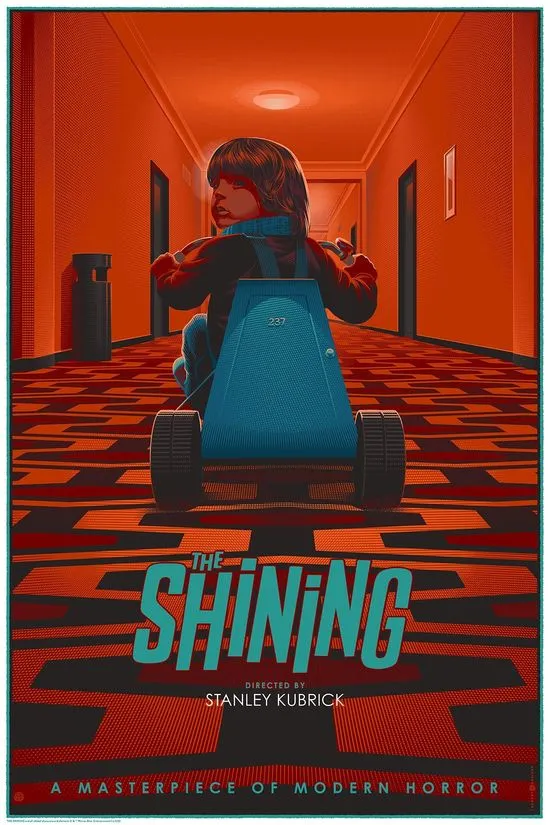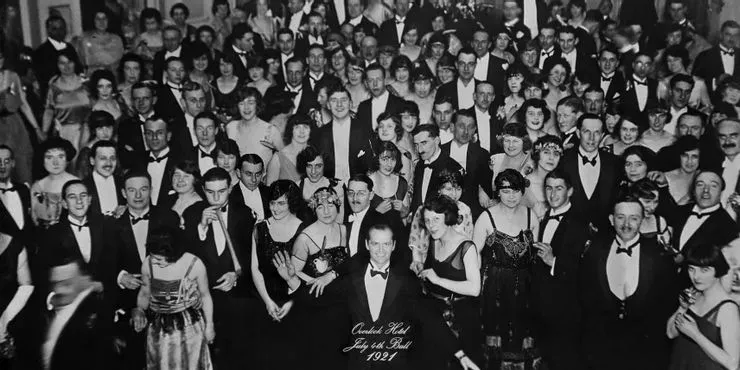

(The ending photo)
Crafting a great horror film is creating a balance between tension, atmosphere and mystery. It's very rare when any movie can utilise all these elements to help tell its story. The film Shining's ability to create horror and psychologically resonate with the audience is unrivalled but it doesn't stop at just being a great horror film because outside of the element of horror the movie creates said discussion. There's an ambiguity that's found within every scene and down every hall of Overlook Hotel that is begging for further inspection because of that the amount of discussion surrounding the film is unparalleled.
The Shining is a 1980 psychological horror film produced and directed by Stanley Kubrick and co-written with novelist Diane Johnson. The film is based on Stephen King's 1977 novel of the same name. Though the story is a bit different from the novel.
There have been countless articles, videos and even books written about it. The film mass majority of these focus on different meanings that the film is hiding rather than adding to that area of discussion.
Today, I want to focus on some techniques that Stanley Kubrick along with all of his collaborators used to create the greatest horror film of all time.
Of the utmost importance to The Shining is the inevitability. Knowing that something is going to happen. The film never tries to hide the fact that the character "Jack" is dangerous. Within minutes of the opening of the film, they demonstrated his previous wrongs. They also clarified that isolation for long periods of time can cause people to go insane and on a homicidal spree, which was the case for Jack Torrance.
In this movie, the character I like the most is Jack Torrance ( Nicholson ). When I first saw Nicholson in The Shining movie I felt a little weird cause he is almost in a comedy, he's so light-hearted in certain scenes even in the specifically horrific ones and later I understand those things made this character different. He is creepy but in a different way.
Jack is an aspiring writer and extricating alcoholic who accepts a position as the off-season janitor of the isolated historic Overlook Hotel in the Colorado Rockies, with his wife, Wendy Torrance (Duvall), and young son, Danny Torrance (Lloyd)
Moreover, after Danny learns that they'll be going to the hotel he blacks out even before they arrive at the hotel, you could easily know that it is dangerous and once the family arrives at the hotel things don't get better. Throughout the movie, Kubrick Hughes's visual hints suggest imminent danger. A self-fulfilling prophecy Jack stops spending time with Wendy and Danny altogether leading to his insanity, he chooses to do everything alone and whenever one of them reaches out to him he reacts suspiciously rude.
Kubrick again shows this off visually once they reach the hotel it's rare to see Wendy and Jack in the same frame. Kubrick creates isolation by keeping them apart and even when they're in conversation together it's rare to see them together and on those rare occasions, one is in the foreground whereas another is an afterthought in the background. As Jack descends into insanity he is doing it alone. We can see it whereas Wendy and Danny cannot. Kubrick uses dramatic irony or the audience knowing something the characters don't to create horror through inevitability. In addition to being cut off from one another, then the family is also cut off from the outside world.
Through this inevitability comes tension. At the very start, this movie effectively creates tension that lasts until the very end. The entire film from the opening to the closing just drenches you and permeates your soul with this crushing weight of suspense.
The soundtracks of this movie are one of a kind which makes this film so great. In the collaborative effort, everyone came to ensure that every aspect of the movie can up to a mark to achieve its greatness. The original music tracks composed by Carlos and Rachel Elkind are prime examples of this. These tracks were composed for an analogue synthesizer keyboard as the main instrument creating an unnaturally spine chilling atmosphere. The main theme is based on the dream of a witches Sabbath from symphonie fantastique by Hector Berlioz. The music creates the dark foreboding ominous feel that can be found from the very opening scene. It makes the film more alive. I mean at least for me. Most psychological horror movies have low potential growth in background music. But in this movie, I have been able to feel every scene plummet into the plot and suspense, the praise and glory for those spectacular soundtracks. It's like it dragged you into the story and everything is happening in front of your eyes.
This movie succeeds because it doesn't tell us everything we want or need to know to understand it, a lot is left open to interpretation. It remains a movie full of mystery. Especially the last photo in the ending makes you feel so on edge and uneasy even because you don't know what it means. It feels like you watched it and solved all Its mysteries like a puzzle, you felt that you understood it and had a closeness to it and then a misfit puzzle piece fell out and the entire puzzle deteriorated into the unsolved depth. This movie has the power to make an impact on your mind for a long time, making you think again and again.
In my opinion, this movie is a masterpiece in the psychological horror films universe.